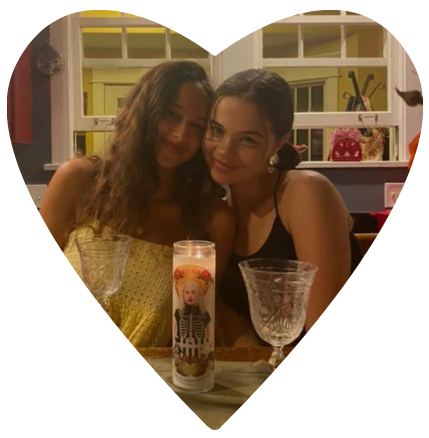Opinion | The importance of female friendships

April 20, 2023
Often, we hear the tired statement made by teenage girls who have deep rooted internalized misogyny: “I have more guy friends because they’re less drama.” We fundamentally disagree with this argument.
Have you seen men after their team has lost the Super Bowl? Ignoring the obvious irony of this overused excuse for minimizing female emotions, why is it such a common sentiment? It does nothing to benefit the women who use it, and instead devalues the importance of female friendships. Beyond braiding hair and dancing to Taylor Swift together, having long lasting friendships with other women is deeply beneficial to social and cognitive development. While over half the world identifies as women, it can still feel ostracizing and overwhelming to be a teenage girl. While it is often hard to navigate being a teenage girl, support from female friendships can make it much easier.
But first, let’s examine how misogyny has skewed our ideas of female friendship. When girls say they are friends with men instead of women because they are “less drama,” they are attempting to separate themselves from a cultural definition that equates women to inferiority and weakness. Thus, socially and morally, they want to be seen as simply “not like other girls.” This is classic internalized misogyny. Putting all three billion women in one box, and you in another, insinuates that womanhood is shameful, and one must distance oneself from it to be valued.
Additionally, the idea that women are more dramatic than men comes from a long history of women being labeled as insane and irrational, yet when men have equally, if not more, excessive reactions to things, it’s seen as normal. Embracing this idea only further normalizes the shaming of women for completely normal emotions, and minimizes the importance of emotionally mature relationships; wanting to be friends with men because they are “less drama” is basically saying you do not want any emotions involved in your close friendships. This is harmful to everyone involved. Yes, close friends occasionally have arguments, but from first hand experience, this usually means people care and value the friendship high enough to ensure strong communication is maintained. Distancing ourselves as women from deep, intimate, and yes, emotional relationships is robbing ourselves of the kind of friendship everyone deserves.
Women may feel inclined to disparage female friendships because there just isn’t much social importance placed on them. Misogyny tells women that the most enriching relationship they can have in their life is a romantic relationship with a man. This is the age-old phenomenon of framing male affection as a medicinal commodity which women are incomplete without. When women embrace this doctrine through internalized misogyny, they begin to devalue their prominent female relationships, even though these are the exact relationships which can truly lead to a more complete and fulfilling life. In her book “Communion: The Female Search for Love”, Dr. bell hooks writes of the imposed primacy of romantic relationships on women, saying, “Most women in patriarchal culture have experienced the heartache of losing closeness with a female buddy when she finds her man. Since female allegiance to males upholds heterosexism, most men demand of their partners that they be the sole primary bond she holds dear.” Having a steady support system in the way of solid, healthy friendships leads to increased self-assurance and emotional harmony for any person. Through patriarchy, women are stripped of this imperative part of life to create emotional lack and instability, and then told the only remedy to their suffering is a heterosexual romantic relationship rather than a healthy, loving community of quality friendships.
When we embrace female friendships, we powerfully counteract this narrative in our own lives and choose to find affirmation and love all around us, rather than pinning it to the incredibly narrow landscape of heterosexual romance.
What do female friendships mean to you? We asked 10 girls at ETHS to talk about their experiences and here is what they said. “Close female friendships have taught me how to communicate, empathize and so much more.” When asked about how these friendships helped them navigate the hardships of highschool one person said, “There are so many things and changes happening in our brains and bodies and it would be a terrifying experience to go through alone. Female friendships in high school are fundamental to the wellbeing of any girl.” A similar sentiment to this, another girl said “I think they keep us from feeling dangerously alone. In high school we start to hate our bodies, and pick ourselves apart.” Female friendships help high school not be so isolating and provide comfort when we need it most. We asked them what they get from female friendships that they can’t get from male friendships. “There’s a much greater sense of closeness and understanding – it creates a more comfortable space to let go and be yourself. It’s much harder to feel that type of freedom with a man, no matter how close you may be.” Finally we asked how they don’t let society’s misogyny tear their female friendships apart. It is really hard. Sometimes I find myself judging or comparing myself to women I love and I have to remind myself that that stuff isn’t real. That it can only hurt your relationships and you.”
Female friendships are devalued because they are completely countercultural to a patriarchal system. They affirm that women have the ability to love and be loved, to be complete and happy, without a male companion, even without traditional romance. They also encourage women to have robust and multifaceted lives, as opposed to the narrow role given to them of wife and mother. Most importantly, maintaining close relationships with other women gives us a wonderful sense of understanding, belonging, and acceptance through all of life’s ups and downs. At the end of the day, where would any of us be without our girlfriends?




















Amy Montanez • Sep 23, 2023 at 6:50 am
Well done! As a therapist and author, it makes me smile to know that you are championing the value of female friendships. Although I am happily married, I would not get through life without my girlfriends. And I love that you are exploring how the patriarchy fears female bonds and what this means for all of us. Thank you and keep it up.